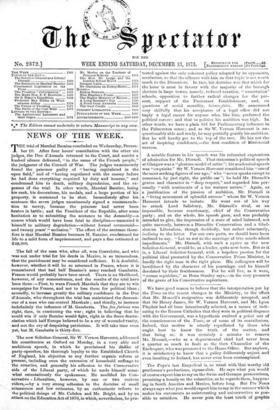The new Solicitor-General, Sir W. Vernon Harcourt, addressed Ills constituents
at Oxford on Monday, in a very able and ambitious speech, in which he proclaimed his &him of party-speeches, his thorough loyalty to the Established Church of England, his objection to any further organic reform at present, including even the extension of household suffrage to the counties, and generally his adhesion to the Conservative side of the Liberal party, of which he made himself some- what ostentatiously the spokesman. He modified his Con- servative - Liberalism, however, by one or two curious riders,—by a very strong adhesion to the doctrine of small armaments and low estimates, by an enthusiastic tribute to 'the political doings of Mr. Cobden and Mr. Bright, and by an attack on the Education Act of 1870, in which, nevertheless, he pro-
tested against the only coherent policy adopted by its opponents, secularism, so that the alliance with him on that topic is not worth much to the Dissenters. In fact, his doctrine was that which for the hour is most in favour with the majority of the borough electors in large towns, namely, reduced taxation, " unsectarian" schools, opposition to further radical changes for the pre- sent, support of the Protestant Establishment, and, on questions of social morality, laissez-faire. He announced very skilfully that his acceptance of a legal office did not imply a legal career for anyone who, like him, preferred the political career ; and that in politics his ambition was high. In other words, we have a plain bid for Parliamentary influence in the Palmerston sense ; and as Sir W. Vernon Harcourt is un- questionably able and ready, he may partially gratify his ambition. But he will hardly get to the top of the tree. He has not the art of inspiring confidence,—the first condition of Ministerial success.










































